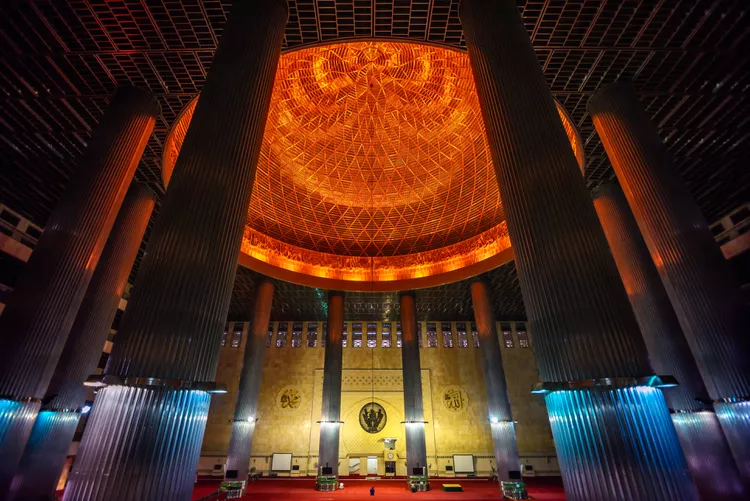1. Summary
Often the most iconic and beautiful buildings in a city, mosques are a constant sight throughout one’s travels in Southeast Asia. Skylines across Indonesia, Malaysia, and Brunei are punctuated with the tall minarets and curving domes of mosques, and the mesmerizing wail of the call to prayer resounds throughout cities five times a day.
However, there’s no reason to be intimidated by Southeast Asia’s mosques. Visiting them is a valuable learning experience and may become a highlight of your trip. Moreover, mosques like Jakarta, Indonesia’s Masjid Istiqlal and Kampung Kling Mosque in Malacca, Malaysia, are accustomed to welcoming foreign visitors and frequently offer enlightening experiences.
Followers of Islam warmly welcome tourists and the general public inside most mosques and will gladly answer your questions; however, it is crucial to respect the culture. Therefore, knowing the proper etiquette for visiting a mosque in Southeast Asia before you go is essential.
Understanding Cultural Respect
Similar to visiting Buddhist temples in Southeast Asia, mosque etiquette is primarily based on common sense. Follow these simple rules of etiquette when visiting mosques to ensure that you do not cause offense.
Mosque Etiquette Guidelines
Remove Your Hat and Shoes
Hats and sunglasses should always be removed before you actually enter a mosque. Leave your shoes on the rack at the entrance. Some mosques may provide plastic covers for your feet.
Be Respectful
Avoid making loud noises or engaging in unnecessary conversation inside of mosques. Turn off mobile phones, refrain from chewing gum, and do not bring food or drinks into a mosque.
Do Not Point Feet
While sitting, avoid pointing your feet in the direction of the Qibla, the direction of Mecca. Qibla is the direction that Muslims face while praying, and it is marked by a wall niche known as miḥrāb in most mosques.
Dress Appropriately
Modest dress is essential. Men and women should both cover as much skin as possible; women are required to cover their heads.
Clothing
Perhaps the most crucial rule of etiquette often overlooked by tourists is that both men and women are expected to dress appropriately. Modest attire is the norm; shirts advertising rock bands, slogans, or bright colors should be avoided. Larger mosques in tourist areas often loan appropriate attire for visitors.
Women
Women should cover all skin, and ankle-length skirts or pants are required. Sleeves must extend to each wrist, and the hair should be covered with a headscarf. Clothing that is too revealing, clingy, or tight is inappropriate.
Men
Men should wear long pants and plain shirts without messages or slogans. Short-sleeved shirts are acceptable as long as the sleeves are not shorter than average; if in doubt, wearing long sleeves is advisable.
Rules When Entering
Sometimes, men and women use separate entrances, so look for signs to understand the specific mosque’s protocol. The typical greeting in Arabic for those entering mosques is “Assalam Allaikum,” which translates to “peace be upon you.” The appropriate response is “Wa alaikum-as-salam,” meaning “peace be upon you too.” Tourists are not obliged to respond, but doing so conveys respect.
It is customary to enter with the right foot first and exit with the left foot first. Additionally, members of the opposite sex should refrain from offering handshakes upon greeting inside a mosque.
Visiting a mosque is typically free; however, donations are appreciated.
Understanding Prayer Times
Muslims are expected to pray five times each day, with the sun’s position determining the times. Consequently, prayer times may vary between regions and seasons across Southeast Asia (and globally). In general, tourists should avoid visiting a mosque during prayer times. If present during prayers, visitors should sit quietly at the back wall without taking photos.
Photography Guidelines
Photography is allowed inside mosques; however, you should never take pictures during prayer times or of worshipers performing ablutions before the prayer.
Visiting During Ramadan
Mosques (referred to by followers of Islam as masjid) are generally open to the public during the Islamic holy month of Ramadan. Visitors should be particularly sensitive regarding smoking, eating, or drinking in the vicinity of mosques during the fasting month, as many followers will be abstaining from such activities during this holy period.
To avoid disturbing locals enjoying their potluck-style iftar dinners, it is best to visit mosques before sundown during Ramadan.





